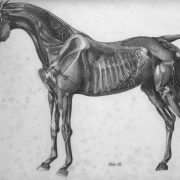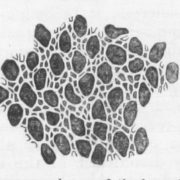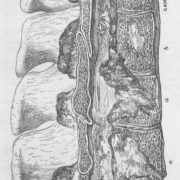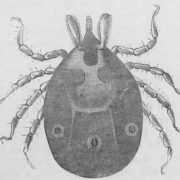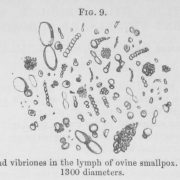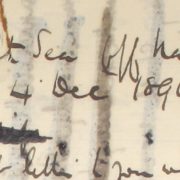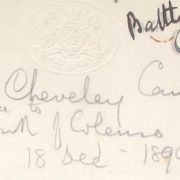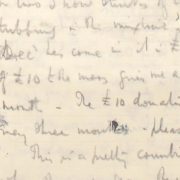[FS/2/2/4/2/4] (1)
In front of Colenso
30 December 1899
[Salutation Redacted]
[[1]] I am not quite sure whether I have missed a mail, all record of time days & weeks are lost here, but I am under the impression that I wrote a week ago, our mails are very erratic so any irregularity you will excuse.
Here we still are looking at the Boers strongly entrenching themselves & making the place an utter impossibility to attack. we[sic] as usual are doing what the celebrated Duke of York did, marched up one a hill & then down again, or rather we do less for we do nothing. Our Generals are incompetent & have the funks[?] on board, while the “gentleman in Khaki” remains as good as ever. However enough of this incompetency & let me tell you my story of the week which is neither full of interest nor I fear entertaining.
You will remember that we have a battery of
[[2]] naval guns here, which fire daily at Colenso & the Boer entrenchments. Well it appeared that in spite of their fire they did not kill many Boers & they were puzzled to account for it. I helped them solve the problem, I found out from one of our fellows who was out on No 3 picket that from his hill outside our camp he could see into the Boer trenches & with his glass watched them dodge our shells by getting into a donga (viz a small valley) it struck me this was [1 word illeg.] important information & I walked up to the Naval Bgd Camp late that night & told Limpus the team[?] and Officers all about it, further I took Jarvis up who had been on this picket. Limpus at once said this is most valuable information & I shall go in the morning & see the place, he did so, altered his angle of fire & yesterday gave the Boers a “gruelling such as they had not had previously. We saw a Lyddite[1] shell fall into a group of about
[[3]] 150 men & burst. How many souls were sent to eternity – – I do not know[.] Poor devils it is rather on my conscience, but all is fair in war & they dont[sic] study us much. The night I paid him a visit words a special treat for the Boers was arranged viz a bombardment, it had been ob-served for days that a particular house was occupied apparently at night & it was believed that many slept there.
During the day the guns were carefully laid & it was arranged to shell the place at night. It was a grand sight, the mass of flame, the terrific roar & the howling of the shells through the air. Several shots were fired & in the morning the place was seen shattered. “Left gun ready!” at this word of command I remarked to Jarvis, how many souls are about to be lodged into eternity who at this moment are quite unconscious of their fate?
War is a very dreadful thing but it has its humorous aspects. In the morning a gun goes
[[4]] bang & from all parts of the camp go up a howl of delight, There’s their breakfast says one, & in the evening you hear the remark “now there[sic] going to have supper”. The horrors of war make no impression on the soldier, his language is worse than ever, his demeanour one of utter indifference. It is well it should be so.
We signal to Ladysmith by electric light at night, the blinking powerful beam is concentrated on the darkest sky & they read the message by the flashes. The Boers try to intercept the beam by projecting a stream up of electricity — from their lamp & concentrating it on ours, as we shift they shift & so we play the game of hide & seek. Whether they succeed in masking our messages I do not know.
The rains started yesterday afternoon & it rained straight off for 12 hours, the men were washed out, the rain came through
[FS/2/2/4/2/4] (2)
[[1]] our tents too freely to be pleasant & our dinner was eaten in the open in a perfect deluge. It was most amusing to see us, no light could be kept going owing to the wind & we had boiled muttton for dinner fat & lean were indiscriminately partaken off[sic], the rain made plenty of gravy on the plates we stood in pools of water, boxes for the tables to sit down was impossible, I got a piece of cake cut with a knife with which sardines had previously been eaten & the mixture was foul in spite of it we remained cheery & to keep up the hearts of the men who were huddled up in their tents (16 in a tent!!!) we sang like Trojans all the popular & unpopular airs we could think of winding up with old Lang Syne[2] & God save the Queen altogether it was a great success & a determination to be happy at any cost[.] My waterproof sheet was invaluable, but all ones clothes have to be dried & aired by forming a pillow of them. You
[[2]] never saw such a collection as that pillow is, it is something like our beloved boy’s pockets on a large scale. I am writing this in bed, it is still raining, horses which have broken loose keep pattering around my tent as if they were walking in pea soup, their feet catch in the tent ropes & you think your mansion is coming down by the rain. Still one is on service & therefore all discomforts are taken in the true spirit of philosophy. I get very little sleep at night & none in the day I wish I slept better. The man living with me sleeps through everything thunder storms[,] guns[,] rain & wind. The other night we had a terrific thunderstorm, the lightning was so blinding that I had to cover my eyes with a handkerchief, a mule was struck & killed, but Wise heard nothing.
I have left the doctors tent & now live with Wise the service sub: he is a delightful
[[3]] fellow to live with (at this point I thought I heard my horse break loose, so I had to get out of bed pull on my rubber boots crawl of the tent which we have to keep closed on account of rain & go out in the pouring rain to look for him[.] I found it was my new pony[,] which I picked up to day straying & so commandeered him & he has gone off Goodness knows where. Will have to look for him in the morning as he is for Morton to ride)
Well Wise is a married man[,] a tall very good looking cheery Irishman full of fun & humour & as straight as they are made. He was ADC to Cadogan & knows everyone & everybody. He tells me that the daughter who bolted with that fellow was the last person on earth that he would have suspected of such a thing, further that when she returned she was not the least penitent!! I don’t like to be too curious, but I shall ask him more
[[4]] about it some day. She was tired of her husband. Wise married the sister of Little who commands 9th Lancers in Cape Colony. Wise has no children, in fact has only been married a year, he was on the point of leaving when the war broke out so he withdrew his papers, but he will leave immediately after the war[.]
31st Dec. The last day of the year [2 lines redacted]. We had a very wet night & I was up twice tying up my horses which broke loose. I did not know to day[sic] was Sunday until I heard Church parade. We have not fired at the Boers to day[sic] but I expect they will not be allowed to escape the New Year. Yesterday I met for the first time Larnder A.V.D, I say for the first time as we have been here 3 weeks & he never had the civility to call over. A case of glanders occurring in his charge has brought us together. He is the man who left me the
[FS/2/2/4/2/4] (3)
[[1]] whole camp to look after, so I dropped a line to Crawford. [1 line redacted]. The Cavalry Bgd here is under the command of The Earl of Dundonald.[3] I knew him as Lord Cochrane 2 Life Guards, he remembered but did not condescend to shake hands. He is a first class idiot & to his care has been committed 2000 Cavalry — He makes as much use of [3 words illeg.] would do if suddenly put in his place. He is a laughing stock — most incompetent; this is the class of man chosen as Generals in this campaign[.] I hope he may soon be relieved.
We are feeding well, actually get Bread every day[sic] instead of Biscuit . The A.S.C[4] are running this show splendidly not a hitch anywhere.
1 January A happy new year to you [1 line redacted], such were the first words on my lips as I awoke this morning to the sound of our naval guns shelling Colenso. May the year
[[2]] prove a happy one for all of us [2 lines redacted]. I could fancy I saw you take the children to my portrait & wish me every happiness. I am sure you will never let them forget me, but I left them at such an early age that I fear I will be a mere mist in their childish recollection & the thought of this pains me beyond description [2 lines redacted].
The news today is that we remain here another three weeks, but there may be no truth in the report. As a matter of fact we know far less what is going on than you, all our information even from London is a week old & we get very little of it. There is some idea that [2 words illeg.] will be made from three distinct points in S. Africa simultaneously. We have heard of the concern & amazement of[?] in London of Buller’s defeat & the determination to carry
[[3]] on the war at all risk. This is as it shall be, in the long run we will win but our losses will be very heavy. You will remember how I predict[ed] this would be a big business.
To night[sic] we received a telegram from the Queen wishing us a Happy New Year & concluding with ‘God Bless you all’ the men cheered heartily.
We have also heard that she is sending a box of chocolate to every officer & man with a special seal or impression on it. This will be very valuable in 20 years time — I will send my box back to you to be kept in memory of the campaign.
No mail in yet, how I look forward to your letters, [3 lines redacted].
Plenty of picture papers come to the mess, all the views of the campaign are very faithful, but you cannot see the appearance of the men, some with beards, all in filthy dirty clothes, for they have slept in them ever since we left Durban[.]
[[4]] Think of that, & water at a premium. Every drop I wash in Morton has over two miles to walk for!! imagine what it is for the men. But they all work well & in camp you would think it was simply peace manoeuvres [.] Games going on for those not on outpost duty & it is only the roar of the naval guns & howling of their shells which remind us of the sterner duties we are on.
When the Record contains anything of importance send it on to me. [2 lines redacted]. The following veterinary officers were present at the Battle of Colenso on 15 Dec last viz V-Major Gladstone, F. Smith, V Captain Larnder & V. Lieut Houston. The casualties among the horses was very heavy from mauser bullets & shell fire. The Artillery suffered heavily ” [2 lines redacted] This campaign will last some time & I am already
[FS/2/2/4/2/4] (4)
*[5]
[[1]] 2nd January. My news to day[sic] is that the English mail arrives to morro[w]. I am like a child at Xmas time & hardly know how to wait for to morrow[sic] to come [2 lines redacted]. Our stay in this camp have one advantage for me & that is I can write regularly to you, later on when we move north again they will I fear be somewhat irregular[.]
I got a note from Holt to day[sic] which has been travelling about for nearly a month saying that had recd my travelling money from the Paymaster. Tell them please at once when they address me to put on the envelope attch 13 Hussars, that will always find me. I told you in the early part of this letter what a rotter Dundonald was, here is an example. He organised a show[?] night attack on the Boers a night or two ago[.] Some troops were to fire on our left & then the centre would advance & to give the Boers an idea of how careless the British
[[2]] soldier was he was to appear as if smoking to simulate this he was to go along striking fuses which Dundonald provided, the Boer would then rush out & our Naval guns were to polish them off — did you ever hear anything so childish? The Boer position is 41/2 miles from us, & at that distance they were to see half a dozen fuses & mistake them for lighted pipes!! God help us, this is the class of General we have. I need not say the Boers were not drawn out & the naval gunners retired disgusted.
Our water has been jolly bad for the last day or two & now stinks of rotten eggs. fancy tubbing[sic] in this mixture! My mess bill for Dec’ has come in it is £4-10- & a donation of £10 to the mess gives me a bill of £14-10 for this month — the £10 donation has to be repeated every three months – pleasant prospect!!
This is a pretty country like Devonshire but where there is no grass there are rocks, some of the places we ride over are positively frightful
[[3]] nothing but big boulders. One strange feature is that there are no trees, there is not a place one can get under as shelter from the sun & there are in consequence no birds except vultures. The absence of trees strikes one as very remarkable.
The natives prefer a bit of skin hanging over their posteriors & a few strips of leather in front[.] The majority dress in Europe clothes viz a wide ombre[?] hat, a long feather or quill stuck bang through the ear & a coat made out of a sack with arm holes. The native servants dress in masters[?] clothes but even these have a fashion peculiar to themselves[,] a long strip of black cloth on the inside of both legs or a pair of light coloured legs with a long crescent shaped patch on the seat of the same are common objects, they all love the large hat. A soldiers tunic, gaiters no boots & bare legs are also very fashionable. They are fine men & very black.
A cavalry patrol to day[sic] bagged five
[[4]] Boers which avenges the men we recently lost.
There is a man here with a camera for taking living pictures of the troops & the fighting[.] I spoke to him this morning & he told me they were taken for the ‘Empire’ where they will be exhibited — You must try & see them. He got some views of the battle of Colenso which will be of especial interest to you. Your brother can easily find out where they are on.
The rain has left off the last two days have been very fine — Place still full of scorpions, Morton had one on his shirt yesterday but fortunately was not stung — They make a hole in the ground into this we insert a piece of grass & say “are you there” the scorpion indicates his presence by laying hold of the grass in his claws & we then dig him out. There are thousands, how we escape being stung I do not know.
[FS/2/2/4/2/4] (5)
[[1]] 3 Jany. Is it not sickening the mail due at 8am to day[sic] has not yet turned up though it is now 5.30pm. [2 lines redacted]. It is now raining & the water is dripping on to my bed, I shall go down to the post office tent & make enquiries. We sent out & looted the farm of a disloyal farmer to day[sic] all his crops were brought for consumption, the men killed his pigs, the irregular cavalry closed on the grand piano, Jarvis got a spring mattress & stool, the former we magnified[?] into a beautiful brass bound double bed. [1 line redacted]. The Colonel got a Kaffir[6] dress of beads & strings in front & strings & beads with tails for behind, they were hanging up in the home & are evidently very good specimens[.]
I must try to get you one this is the first I have seen here but if we ever take Colenso we will do a good deal of looting on our journey through Natal[,] all the disloyal farmers will be looted. Crawford was here this morning for a short time my puggaree[?] having
[[2]] bleached nearly white with the sun. I have had to leave it off as it rendered me too conspicuous & I might have found a mauser bullet through it, I was asking Crawford to get me a Khaki one at Maritzburg. I have drawn no money yet. I have sent to the branch bank of the Standard at Maritzburg & though some days ago have not recd any reply. I wrote to know whether the Standard Bank of Cape Town had notified to them that a balance of £100 existed in their books to my credit. No reply up to date & that was a fortnight ago. The fact is that everything is paralysed through the war & the country is being rapidly ruined. Men of wealth are serving in the ranks of the local regts men of substance as business men in the Transvaal are serving as conductors in the Transport. I fancy there is very little real business going on.
As to our future movement I know nothing more than when I last wrote. I know we want more men, many more & we need Generals, however, we shall see. I wish I had a chance of doing something.
[[3]] Here is rather a good story[.] A man lost his rifle at the Battle of Colenso & a Court of Enquiry is held[,] the man gives his evidence as follows “Beg your pardon Sir! it happened that at that there last Field Day we had at Colenso” se se. This shows you what Tommy thinks, when he describes one of the most severe battles of the Century as a Field Day!! The fact is that he is a ripper & after what I saw on that day I’d make everybody take off his hat to him as he passed. I have always been very fond of him & it has not been misplaced. Don’t[sic] forget what Kipling says Its Tommy this & Tommy that etc but its “Thankyou[sic] Mr Atkins when the guns begin to play”.[7]
I have written so much to you during the last three weeks that I have nearly run out of all the paper I brought with me for the whole campaign. There seems to be great difficulty in getting paper, so some of your letters in future may be written on some funny scraps.
[5 lines redacted]
[[4]] What ever[sic] you send me through the post mind you register Tobacco or anything else, remember things are this is a country for “jumping” otherwise known as stealing. (By the bye my commandeered ponies were claimed today). Anything I sent you I will register if possible. Perhaps you sent me a plum pudding for Xmas or a Xmas Card, if so neither have come to hand yet, though of course they may be in the belated mail.
Burberry’s address (the maker of waterproof cloth or rather canvas) is 30 Haymarket, just above the C. S Stores. Of course I do not want that coat yet. [5 words redacted] It must be of stout canvas & on the dark side of Khaki — open like a plain file coat at the neck to give plenty of air but otherwise just like the pattern I brought out with me. If the campaign comes to a sudden conclusion I will not want it, my present one will last me at least six to eight months, but the warm coat I must have soon[,] mind you register it, also insure it to its full value in case of loss. My face is raw, my ears cracked, I am still pealing[sic] like a potato my skin appears to get no tougher.
[No valediction]
(Please note that work on this transcript is on going. Users are advised to study the electronic images of this document where possible – http://rcvsvethistory.org/archive-collection/fs-working-papers/)
[1] Lyddite or Picric Acid. First generation of modern “highly explosive” shells used by British forces, that began use in 1896
[2] Auld Lang Syne, poem written by Robert Burns in 1788 later set to a popular tune, song often used for its connotations of farewell and ending
[3] Lieutenant General Douglas Mackinnon Baillie Hamilton Cochrane, 12th Earl of Dundonald, KCB, KCVO (29 October 1852 – 12 April 1935), styled Lord Cochrane between 1860 and 1885, was a Scottish representative peer and a British Army general.
[4] Army Services Corp
[5] Annotated as page 5.
[6] South African dialect, used as an insulting term for a Black African
[7] 1890 Poem by Rudyard Kipling. Reprinted in his 1892 Barrack-Room Ballads, a series of songs and poems surrounding the late-Victorian British Army. Tommy Atkins was a slang term used as a name for ‘common’ British Soldiers. http://www.kiplingsociety.co.uk/poems_tommy.htm

